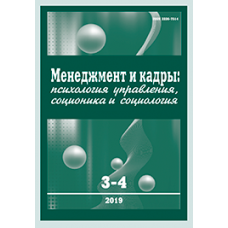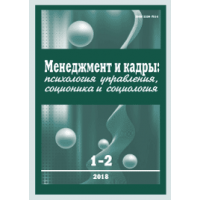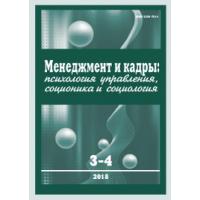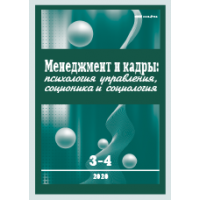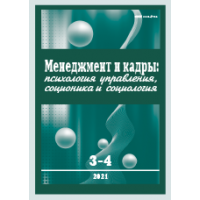Номер № 3-4/2019 журналу «Менеджмент і кадри: психологія управління, соціоніка та соціологія»
Методи соціоніки в менеджменті
Соломко Л.Р.
Головний фактор ефективності діяльності організацій стóіт інвестицій
Описано відкриття, зроблене на стику наук про людину та інформатизації суспільства, яке можна порівняти лише з відкриттям періодичної системи хімічних елементів. Показано необхідність освіти персоналу всіх рівнів щодо нього. , сім'ї та методи усунення цих протиріч.
Ключові слова: соціоніка, відносини в колективі, тип особистості, конфлікт, усунення конфліктів, управління, керівник, персонал.
Шлаїна В.М.
Соціоніка та глобальні компетенції ХХІ століття
< Людина майбутнього має бути готовою жити в мультикультурному суспільстві, приймати різні системи цінностей та виконувати свої завдання з урахуванням їх різноманіття. соціонічних знань та навичок можна з дитинства розвивати творчі задатки людей та їх вроджені схильності з урахуванням соціонічних типів, а також вчити людей шанобливо взаємодіяти – не завдавати іншій людині шкоди, ні фізичної, ні моральної.Ключові слова: мультикультурне суспільство, соціоніка, соціонічний тип, взаємодії в суспільстві, робота в команді, спроможність до критики та самокритики, міжкультурні відмінності. стимулювання
Проаналізовано цілу низку рекомендацій щодо стимулювання персоналу та мотивування дітей, даних у літературі з менеджменту і психології, і навіть критично розглянуто концепція Піраміди потреб А.Маслоу. . Ці рекомендації спираються на моделі обробки інформації в структурі кожного типу, які відшліфовані десятиліттями досліджень та перевірені на величезному практичному матеріалі.
Ключові слова: менеджмент, психологія, стимулювання персоналу, мотивування дітей, піраміда Маслоу, соціоніка, тип особистості, обробка інформації, структура психіки.
Інструменти менеджменту
Карпенко О.Б., Букалов А.В.
Професійна діяльність та соціонічний тип
На базі багаторічної консультаційної роботи Міжнародного інституту соціоніки на більш ніж 140 підприємствах, фірмах, компаніях, банках та торгових мережах, включаючи 30 підприємств РАТ "Газпром" і 20 супутніх організацій різного виду діяльності в районах Крайньої Півночі, розглянуті питання зв'язку особливостей соціонічних типів різними видами професійної діяльності. · Групування відділів за видами діяльності - виробництво; охорона, медицина, спорт - дала можливість вивчити розподіл соціонічних типів у професійних сферах. , менеджмент, соціоніка, соціонічний тип, професійна сфера діяльності, виробництво, управління, комерція, сфера послуг, науково-технічна сфера, інформаційна структура професійної діяльності.
Нові технології
Джелалі В.І., Кулініченко В.Л.
Визначальні особливості науки завтрашнього дня
Активна, а тим більше масова науково-технічна діяльність, що проводиться та заснована на базі самодіяльності, ініціативи кожного, вимагає постійного інноваційного забезпечення, розвиненої, особистісної та соціальної інноваційної культури. , підприємців, молоді та літніх, журналістів, політиків) та прискорення включення решти до активного творчого процесу, їх самоорганізації та матеріально-технічного забезпечення такої діяльності.
Ключові слова: інновації, винаходи, конкуренція, наука, національний розвиток.
Кручинкіна Д.І.
Функція «вольова сенсорика» всіх інших аспектів. функція в лаборних блоках СуперЕго та Ід, аналогічна лексика становить лише 6% від загального лексичного масиву.
Ключові слова: соціоніка, інформаційна модель психіки, лексика, психологія, вербальні блоки, лаборні блоки, модель А, мовна комунікація. Роздуми
Попов В.П., Крайнюченко І.В.
Проблеми на шляху до ноосферного суспільства
Докладно розглядаються проблеми на шляху руху людства до ноосферного суспільства. Показано, що численні варіанти соціальної поведінки людей визначаються невеликим комплектом базових генетичних програм. Панування тварин інстинктів над іншими компонентами психіки. інтуїцією та ін.) розглядається як фактор, що гальмує еволюцію людства. Культура та ідеологія розглянуті як механізми управління суспільством. , суспільство, історія, культура, ідеологія, еволюція, ноосфера.
Менеджмент і кадри 3-4/2019
- Модель: выпуск журнала «Менеджмент и кадры…»
-
$3.00
- Ціна в бонусних бали: 30
Рекомендовані товари
Менеджмент і кадри 1-2/2018
Номер № 1-2/2018 журналу «Менеджмент і кадри: психологія управління, соціоніка та соціологія&r..
$3.00
Менеджмент і кадри 3-4/2018
Номер № 3-4/2018 журналу «Менеджмент і кадри: психологія управління, соціоніка та соціологія&r..
$3.00
Менеджмент і кадри 1-2/2019
Номер № 1-2/2019 журналу «Менеджмент і кадри: психологія управління, соціоніка та соціологія&r..
$3.00
Менеджмент і кадри 1-2/2020
Номер № 1-2/2020 журналу «Менеджмент і кадри: психологія управління, соціоніка та соціологія&r..
$3.00
Менеджмент і кадри 3-4/2020
Номер № 3-4/2020 журналу «Менеджмент і кадри: психологія управління, соціоніка та соціологія&r..
$3.00
Менеджмент і кадри 1-2/2021
Номер № 1-2/2021 журналу «Менеджмент і кадри: психологія управління, соціоніка та соціологія&r..
$6.00
Менеджмент і кадри 3-4/2021
Номер № 3-4/2021 журналу «Менеджмент і кадри: психологія управління, соціоніка та соціологія&r..
$6.00

